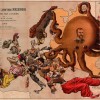In the beginning was the Rome Treaty. 60 odd years down the line the visions that helped forge together that agreement need some new PR. The first steps of European integration were built on the idea that if the main strategic resources were pooled together (coal, steel, atomic energy) and if a situation of mutually […]






